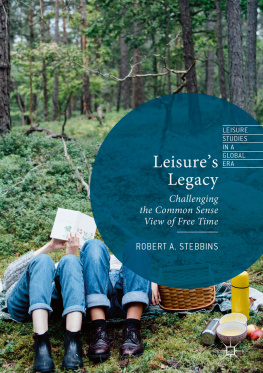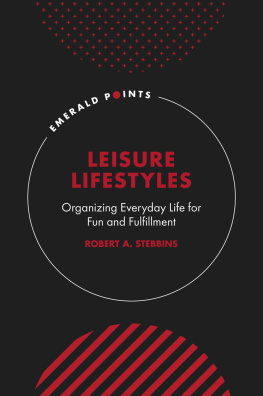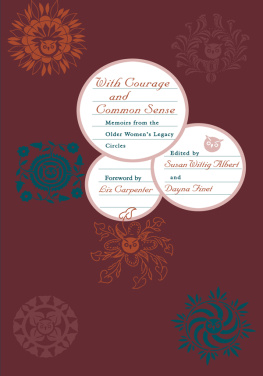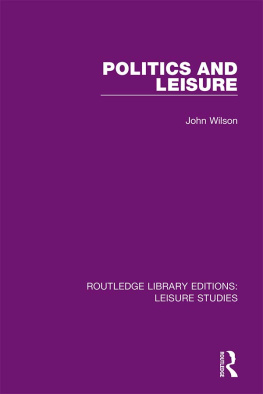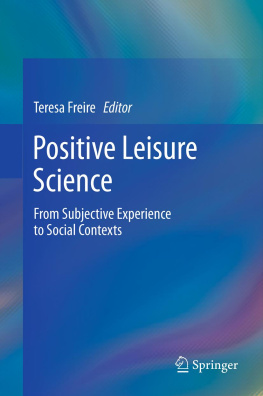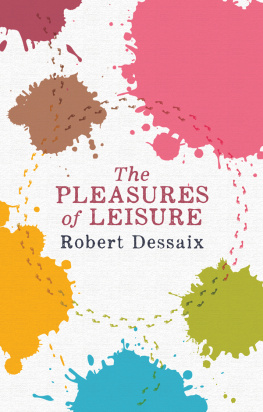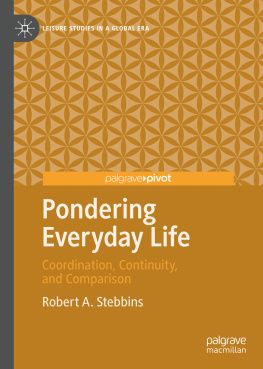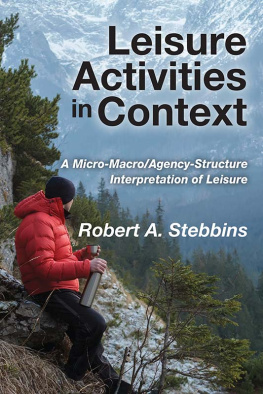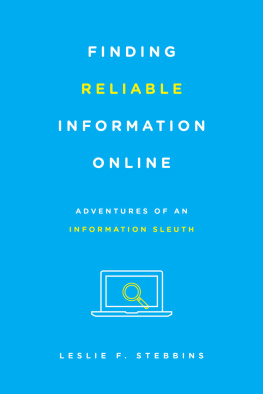1. Introduction: Leisures LegacyChallenging the Common Sense View of Free Time
As with some other complex ideas current in the modern world, that of leisure suffers at the level of common sense from an unfortunate legacy: a combination of oversimplification, moral depreciation, and in some quarters, even lack of recognition. Many people outside the comparatively small circle of leisure theorists, researchers, and practitionersthis indictment includes other scholars and university administrators on the outsidemight well greet this claim with: who cares? But leisures modern legacy is both profound and immense, despite approximately 45 years of steady research, application, and theory development. In other words, there is plenty of evidence to justify the central proposal in this book that the common sense view of free-time activities can and should be confronted.
And who should do the confronting? That job falls to the leisure studies professors, researchers, practitioners, and their students; it is them for whom this book is written. Ideally, the vast world of common sense would also take an interest in these pages, but alas, the pages are probably too many and too complicated for most of the general public. Meanwhile, the first group needs to know much better the mentality of the people whom they study and how the second look on the free-time phenomena the first find so fascinating and important. How else can leisure science effectively get its word out to the general public than by knowing how they think about leisure?
Let it be clear from the outset that this book is a study of the common sense view of leisure and not an exposition of the scientific field of leisure studies. Part of the latternamely, the serious leisure perspective and certain other conceptswill nevertheless guide this study. Thus the leisure studies literature is invoked only to the extent needed to examine the common sense view and to the extent that this scholarly area has anything to say about this popular outlook. Unfortunately, the scientific writing on this view is extremely thin.
The following chapters will show what this popular outlook is lacking and why it is important to tackle it. In general, the reasons for confrontation are the following. (1) Gatekeepers informed only by the common sense definitions of leisure while working in the institutions of higher education and funding agencies for research and teaching often fail to give research and education in leisure science its due. (2) The general population guided by certain common sense definitions suffers with its ignorance of how it could benefit from a more informed view of free time. (3) Some practitioners in fields where leisure has been shown to benefit clients still refuse to accept this approach. Certain common sense definitions would seem to be behind such thinking. (4) Leisure sciences weak reception in many of the mainstream social sciences (e.g., economics and political science, Stebbins, , pp. 2022) suggests a similar shallow picture there of how people use their free time, why they do this, and why it is important that the general public acquire a more profound understanding of this vast domain of life.
All this might seem like sour grapes: a-nobody-likes-me-but-they-should kind of argument. This retort might have more credibility were it based on a scientific understanding of leisure rather than a commonsensical one. In other words, a more informed response would be to try with data and logic to rebut the four points in the preceding paragraph. Meanwhile, however, this book contains evidence supporting them.
Common sense is defined here as the faculty by which certain beliefs are accepted without philosophical or scientific enquiry or without influence from religious teaching (modified from the Shorter OED, 5th ed., 2002, sense 4). Common sense and popular image will be considered synonymous. This orientation is that of the general public, or the laity (non-religious sense), both also being used interchangeably. They often diverge sharply in their content, effects on participants, and influence in the larger community. Moreover, their effects on the individual and their influence in the community can be positive or negative or a combination of the two.
The obviousness of the two questions is another matter. This issue rests in good part on how leisure is defined by the general public, which includes those scholars and intellectuals who are unfamiliar with leisure theory and research. For example, the work ethic of modern times calls for a person to work hard and avoid leisure as much as possible (explained in detail in Stebbins, ). This book shows how simplistic that image of the role of leisure is.
Be that as it may, the common sense image of leisure in the West or anywhere else has never been systematically studied. For this reason treatment of it in this book must be regarded as hypothetical (note how often I use phrases like seems to, appears to, and probably is). In other words, throughout my career in leisure studies (44 years), I have observed leisure activities and behavior and their place in social life most of the time informally but some of the time augmented by formal data collected by me and several others (see www.serious leisure.net/Bibliography ). This empirical base can give rise to hypotheses bearing on common sense images, but little else. On the other hand, the hypotheses and their component concepts can offer provisional understanding about and direct research in this important but little explored area of leisure studies.
This is part of the evidence to which I referred in the preceding paragraphs. Another part is composed of the qualitative data generated by the L-Squares project, wherein an international sample of university students were asked to draw with a pen on a small square of paper their conception of leisure. The vast majority portrayed there casual leisure in general or one or more particular casual activities. Some squares also or exclusively pictured leisure with a smiley face, the word fun, or both. These data help validate the ideas on the positive common sense images of leisure set out in this book, for those images are mostly anchored in casual leisure. Finally, at least two other thinkers, one a political economist, the other a philosopher, have also observed the common sense image:
In contemporary parlance, leisure is synonymous with relaxation and rest. But there is another, older conception of leisure, according to which it is not just time off work but a special form of activity in its own right. Leisure in this sense is that which we do for its own sake, not as a means to something else. (Skidelsky & Skidelsky, , p. 165)
Notwithstanding doubts expressed earlier another goal of this book is to familiarize the general public with the nature of leisure as set out in the field of leisure studies. That goal is not to create experts, however, but rather to engender a liberal arts understanding of leisure such that the common sense image of it is brought much more in line with its scientific reality. Put otherwise, I am trying to produce an encyclopedia-level of lay knowledge about leisure that enables the (now) educated reader to refine his or her image of it.
Considerable theory and data exist in the field of leisure studies, a scholarly corpus that has been growing steadily since approximately 1970 mainly in North America, Europe, Israel, Australia, and New Zealand. Todays leisure legacy is founded on and significantly shaped by this history of ideas about free-time activities.

